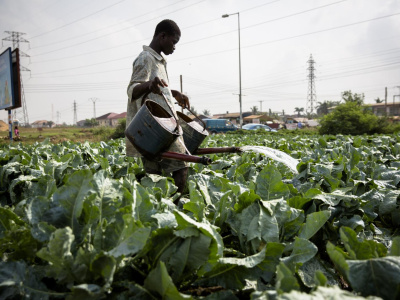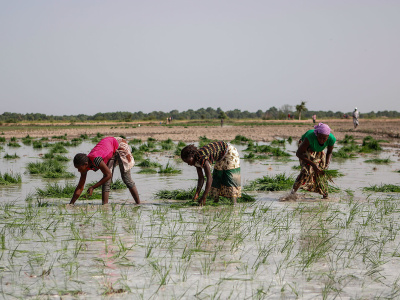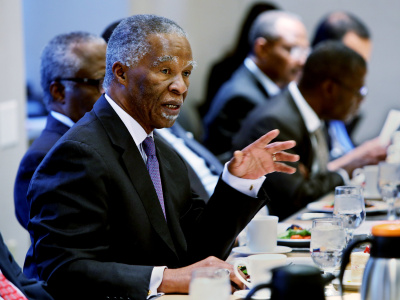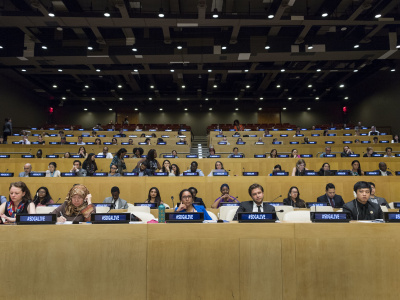
Ten years of promoting policy coherence

Authors
Impact story – Last updated 8 January 2025
By 2030, all nations must deliver on the Sustainable Development Goals (SDGs). That will only be possible if policies work in harmony across different domains. But improving policy coherence is no easy task. It is a political matter, progress is difficult to measure, and often there is little evidence to help us assess whether policies are more or less coherent.
At the halfway point of the 2030 Agenda for Sustainable Development, policy coherence is at a crossroads. To address global systemic issues that are hindering progress, we need to remedy policy incoherencies more effectively. This also means doubling down on efforts to engage with organisations and institutions outside of the development cooperation sphere, generate evidence on the effects of incoherent policies across borders, and create more responsive institutional mechanisms.
In this impact story, we explain what ECDPM has done to promote policy coherence since the debates leading up to the 2030 Agenda, and how ECDPM can help those navigating this complex endeavour.
All policies need to take account of the positive and negative effects they have on other policies. Trade and climate policies, for example, should not undermine each other, but rather create a greater combined effect.
What ECDPM does and offers
ECDPM has been working on policy coherence since it became a key principle of EU development policy – in Europe, Africa and beyond. We focus on how governments manage policy interlinkages in practice, while at the same time helping clarify conceptual issues and sharing lessons learned from various approaches. We also engage with organisations and institutions outside of the development cooperation sector. We have done so through research and analysis; methodological tools; partnerships, communities and events; and advice, support and training.
-
Research and analysis
Our research and analysis have raised awareness and strengthened knowledge on how policy incoherence can be addressed. Several of our publications have been used as learning or reference materials. Our paper on how to move from PCD to PCSD, for instance, was widely picked up.
-
Methodological tools
We have also developed a set of tools to help others navigate policy incoherence. For instance, in 2014 and 2015, we developed an innovative methodology for identifying and assessing the positive or negative effects associated with coherent or incoherent policies, which we tested in Burkina Faso and Tanzania. More recently, we worked on developing a PCSD toolkit with CONCORD.
-
Partnerships, communities and events
We bring people together to advance policy coherence in practice. In 2015, for instance, we set up a community of practice on PCD, bringing together policymakers and practitioners from different European administrations, the European Commission and the Organisation for Economic Co-operation and Development (OECD). Since then, we have hosted two workshops for the community of practice every year, each time focusing on coherence challenges in specific areas. In 2018, the community of practice issued a position on the revision of the OECD Council Recommendations on PCSD.
We have also teamed up with partners in Europe, Africa and beyond on policy coherence projects. We have organised events and contributed to events on policy coherence at two editions of the UN High-Level Political Forum on Sustainable Development.
-
Advice, support and training
We have organised workshops, briefings and training sessions for civil servants and NGOs in several EU member states and European countries – including Belgium, Finland, Latvia, the Netherlands, Portugal, Scotland and Slovenia – and provided input into or support to flagship reports or evaluations on the topic. Examples include the evaluation of the Dutch policy coherence for development action plan for 2018-2022 and several editions of the OECD report on policy coherence for sustainable development.
Policy areas
Beyond covering policy coherence more broadly, we have focused on specific policy areas, including:
- Agricultural and food systems
- Anti-corruption and rule of law
- Civic space
- Climate
- Finance
- Health
- Migration
- Trade
- Water
You can find more examples of our work in the past ten years below – and more importantly, what has come out of it.
Go back to top.

What we have achieved over the past ten years
Go directly to:
2024 – 2023 – 2022 – 2021 – 2020 – 2019 – 2018 – 2017 – 2016 – 2015 – 2014 – Earlier work
2024
Work on food security, water and climate
Drawing heavily on ECDPM research, the evaluation department of the Dutch foreign ministry (IOB) has published its evaluation on policy coherence in Dutch development cooperation on food, water and climate ambitions.
Go back to top.
2023
Policy coherence workshop with the Dutch foreign ministry
In June, we organised a policy coherence workshop with the Dutch foreign ministry to share and reflect on practices, tools and mechanisms to promote policy coherence across government departments. The workshop, attended by civil servants from the Netherlands, Finland, Luxembourg, Austria, Poland, Sweden and the EU, highlighted the policy coherence experience of the Dutch foreign ministry, which has been a leading player in the area.
Evaluation of the Dutch policy coherence action plan
We supported the evaluation of the Dutch policy coherence for development action plan for 2018-2022, which foreign trade and development cooperation minister Schreinemacher shared with the Dutch parliament. We took part in consultative meetings and reviewed the draft evaluation report.
Work on anti-corruption and the rule of law
We applied a policy coherence lens to our work on the rule of law and anti-corruption. This includes work carried out for an external evaluation for the European Commission on the EU’s support to the rule of law and anti-corruption in partner countries between 2010 and 2021 – the main findings of which we summarised here – as well as work carried out for the Swedish Presidency of the Council of the EU, which we presented to the working group on development cooperation of the Council of the EU. Our work fed into the EU Council conclusions on ‘Corruption as an obstacle to development’, following which the European Commission was expected to strengthen its internal anti-corruption capacity.
Go back to top.
2022
Policy coherence study related to climate, food and water
For the evaluation department of the Dutch foreign ministry (IOB), we studied the effects of major economies’ policies on climate action, food security and water in developing countries. We published a paper and summarised the key findings of our work in a shorter piece. Key findings and recommendations of this study were circulated across the Dutch foreign ministry, as well as the infrastructure and water management ministry.
Go back to top.
2021
Policy coherence toolkit
For CONCORD, the European Confederation of NGOs working on sustainable development and international cooperation, we finalised a first version of a PCSD shadow tracking toolkit – a methodology for CONCORD members to assess national governments’ policy coherence efforts and results. This set of documents has guided the network's efforts to provide a different perspective on official SDG reporting and a counter-analysis of policy coherence in EU member states, reinforcing the hand of civil society in asking for more genuine efforts in favour of policy coherence.
Go back to top.

2020
Policy coherence study on healthcare supply chains
We published a paper on policy coherence issues emerging from COVID-19, focusing on healthcare supply chains, which featured in the EU’s Think Tank Review edition on COVID-19 and the recovery fund. It contributed to reflections on health security and equitable access to health products in Europe and Africa. When countries were formulating responses to COVID-19, our paper was used to inform a discussion in the PCD community of practice. It helped focus on key policy challenges, including the need to secure supply chains for health technologies.
Study on policy coherence lessons
We published a policy note on policy coherence lessons learnt in EU development cooperation for the CASCADES project on cross-border climate risks. This note helped formulate the analytical framework of the project, provided guidance for several studies and supported the design of recommendations for coherently managing those risks. We also wrote an article for IISD's SDG knowledge hub based on this CASCADES policy note.
Work on anti-corruption and civil society
We applied a policy coherence lens to our work on anti-corruption, including a commentary and paper on the topic, as well as an article published by Democracy in Africa, and to our work on civic space.
Support to the Slovenian government
We were invited by the Slovenian government to organise a training session for NGOs and a briefing to government officials, ahead of Slovenia’s EU presidency in 2021. The training helped participants formulate next steps to further promote PCSD.
Support to the Scottish government
We organised a workshop for the Scottish government’s external affairs directorate on how to best promote policy coherence for sustainable development in its policies and programmes. In parliament, the Scottish Minister for Europe and International Development mentioned ECDPM, our policy coherence experience and our work with the Scottish ministerial working group on PCSD.
Work on the coherence of trade policies in West Africa’s rice sector
In 2018, we started a project with the Initiative Prospective Agricole et Rurale (IPAR) on the marketing and trade of rice in West Africa, with the support of German development agency GIZ. Continuing our work on the rice sector in West Africa, we stressed the crucial rule of coherent trade policies in partner countries and regions, and with IPAR, outlined an approach for more coherent policies, which we also presented during a webinar. After the webinar, we summarised the discussions and proposals coming out of the webinar. Our work in 2020 drew from discussions we had during a two-day workshop we organised in Abidjan in 2019, with IPAR and the Laboratoire d’Analyse Régionale et d’Expertise Sociale (LARES).
Go back to top.

2019
UN High-Level Political Forum on Sustainable Development
We facilitated and contributed to policy coherence events at the UN High-Level Political Forum on Sustainable Development in New York and presented the findings of recent work on the topic. The UN organisers informed us that participants appreciated the succinct framing and policy insights of one of the sessions in particular. We also shared our takeaways from the forum and preliminary research in a commentary.
OECD report on policy coherence for sustainable development
We contributed to the OECD’s 2019 report on policy coherence for sustainable development, focusing on the value of partnerships for coherence and using our collaboration with Southern Voice and DIE (now IDOS) as an example (see 2018 highlights).
Brief on how to move from PCD to PCSD
For CIDOB, the Barcelona Centre for International Affairs, we wrote a brief on how to move from PCD to PCSD, based on our earlier work on the topic (see 2017 highlights). Through this collaboration we extended our network to Spanish experts interested in policy coherence.
Go back to top.

2018
Policy coherence project with Southern Voice and DIE
We organised a two-day research workshop in Maastricht with Southern Voice, a network of think tanks from Africa, Asia and Latin America, and DIE – the German Development Institute (now IDOS). We collected evidence on what motivates policymakers to be aware of policy coherence and how they implement it in various fields and countries. We used the results of the research done ahead of the workshop to inform a public debate in Brussels and for follow-up projects.
Learning and reference materials
We presented our policy coherence work at an expert meeting at CIDOB in Spain, and some of our papers were used as learning material for an online course on policy coherence for sustainable development by the OECD. Similarly, our work on the political economy of policy coherence fed into the 2018 edition of the OECD’s flagship report on the topic.
Joint position
The community of practice issued a position on the revision of the OECD Council Recommendations on PCSD, which advocated for keeping a strong focus on policy coherence regarding developing countries.
EU policy coherence for development evaluation
Our work on PCD, including our work on how to move from PCD to PCSD (see 2017 highlights), is referred to several times in the external evaluation of the EU’s policy coherence for development between 2009 and 2016, published in 2018.
Study on illicit financial flows
We applied a policy coherence lens to our work on illicit financial flows. Our study mapped the different kinds of illicit financial flows and shared recommendations on how to promote policy coherence in this area.
Analysis of the EU’s progress towards the SDGs
We analysed the EU’s progress towards achieving the SDGs, arguing that it needs to move beyond the rhetoric on policy coherence to put it to the test.
Work on policy coherence for agricultural transformation in African countries
With the Food and Agriculture Organization of the United Nations (FAO), we wrote a report on policy coherence for agricultural transformation in African least developed countries, based on case studies from Mozambique, Rwanda, Tanzania and Zambia.
Go back to top.

2017
UN High-Level Political Forum on Sustainable Development
We co-organised a side event and presented our Burkina Faso case study of policy coherence for food security (see 2015 highlights) at the UN High-Level Political Forum on Sustainable Development in New York. We received many positive comments and noted a lot of interest in how to best promote integrated policy making for the SDGs. We also reported back from the forum, focusing on policy coherence. The study helped us engage in discussions about policy coherence for food security with West African researchers, practitioners and policymakers.
Training for Dutch government officials and NGOs
We organised a two-day training session on policy coherence for sustainable development and political economy analysis for staff members of Dutch NGOs Woord en Daad, PARTOS and Foundation Max van der Stoel, and the Dutch foreign ministry.
Paper on how to move from PCD to PCSD
With the introduction of policy coherence for sustainable development as a crucial principle for achieving the SDGs, we looked at how it differs from policy coherence for development, while identifying experiences and tools that can be of value for policy coherence for sustainable development. This paper was prepared at the request of the community of practice on policy coherence.
Based on the paper, we authored a contribution for the 2017 edition of the OECD’s policy coherence flagship report. The paper is still referenced by the Swiss Development Cooperation, and was mentioned in the 2019 evaluation of Finland’s sustainable development policy, the 2019 EU report on policy coherence for development and the external evaluation of the EU’s policy coherence for development between 2009 and 2016. The evaluation of the Dutch policy coherence for development action plan published in 2023 (see 2023 highlights), which recommends to focus on PCD but as an integral part of PCSD, follows the line of thinking outlined in the paper.
Report on aid and migration exploring policy coherence issues
We undertook a major study examining the effects of displacement and migration challenges on European development cooperation with partner countries, particularly in Africa, exploring policy coherence issues. The study, which was commissioned by the Swedish Expert Group for Aid Studies (EBA), was among the first to systematically map the effects of displacement and migration challenges on European development cooperation. Our presentation at the Swedish prime minister’s press room generated many requests for follow-up work and media interviews. The study came out just in time for the migration summit in Malta.
Report on the evaluations of the European Commission’s external financing instruments
Along with Particip, we led the team drafting an independent summary report on the evaluations of the coherence of the European Commission’s external financing instruments.
Analysis of policy incoherence related to nutrition
A contribution to the sustainable food systems edition of our Great Insights magazine argued that policies affecting the food system are currently not aligned towards improved nutrition outcomes.
Go back to top.
2016
Meeting and study on the impact of European policies on food security in Burkina Faso
With Ouagadougou-based think tank CEDRES, we facilitated a meeting on the impact of European policies on food security in Burkina Faso. This fed into our policy coherence for food security study in the country, which analysed policies affecting linkages between trade and food security (see 2015 highlights). The work was a follow-up to our pilot in Tanzania and helped refine our policy coherence methodology.
Background work for the UN High-Level Political Forum on Sustainable Development
We were part of a consortium of think tanks that did preparatory work on the 2030 Agenda’s concept of policy coherence for sustainable development in the lead-up to the 2016 High-level Political Forum on Sustainable Development in New York. We contributed to a paper by the World Resources Institute that analysed early experiences with preparing for SDG implementation in OECD countries. The paper drew from a number of case studies, one of which was prepared by ECDPM, and analysed the steps taken towards implementation of the SDGs in the EU within the first year of reaching agreement on the UN 2030 Agenda.
Analysis on migration and policy coherence
For the KNOMAD project, we zoomed in on how to strengthen the links between migration and development through improved policy and institutional coherence.
Switzerland case study on monitoring policy coherence
As Switzerland was looking to strengthen its policy coherence monitoring and reporting system, we undertook a pilot study proposing a structured and thorough approach, focusing on food security, migration and development, and illicit financial flows.
Explaining PCD and PCSD
We explained the concepts of PCD and PCSD, highlighting the commonalities and differences and arguing that policy coherence for development still has a role to play.
Go back to top.

2015
Testing the policy coherence methodology
In 2014 and 2015, we tested our methodology to assess the impacts of OECD non-development policies on food security in Africa. We published the findings of our pilot study in Tanzania, undertaken with the Economic and Social Research Foundation (ESRF) and funded by the Finnish government. We also presented the results of this study at an event organised with the multi-stakeholder development policy of Finland. Through this project, we raised awareness and provided evidence about the impacts of policy coherence issues and supported the involvement of African actors in PCD discussions. Due to its success, a follow-up pilot in Burkina Faso was implemented in 2016 and 2017, funded by the Swiss government.
Training to European governments
Throughout the year, we provided PCD training to government officials in Latvia, Finland, Portugal and Belgium.
Set-up of the community of practice
For the Swiss Development Agency and the Finnish foreign ministry, we launched a community of practice on PCD, bringing together PCD focal points from different European countries. Until recently, we also organised biannual workshops with a group of PCD practitioners.
Study on PCD monitoring systems in EU countries
We published a paper mapping the PCD monitoring systems of selected EU member states, as well as the PCD indicators they used. The governments of Switzerland and Portugal referred to this work in reflecting on their own policy coherence systems. We also presented the mapping results to the European Commission and EU member states during a meeting of the EU PCD network.
Input into EU discussions
Several official EU meetings and documents drew on our inputs on PCD. We facilitated a dialogue on policy coherence for food security, organised by CONCORD and the European Commission’s Directorate-General for International Cooperation and Development (DG DEVCO), and we were the only non-official party to attend an EU internal meeting on PCD. Our work was referred to several times in the 2015 European Commission report on PCD.
Dutch PCD monitoring report
We contributed to the 2015 Dutch PCD monitoring report prepared by a group of Dutch NGOs, including Partos, Foundation Max van der Stoel (FMS) and Woord en Daad. We also spoke at several Dutch events on policy coherence for the SDGs and worked with Partos, FMS and Woord en Daad in the context of their ‘ready to change’ project, aiming to provide practical recommendations to the Dutch government for implementing the SDGs at the national level.
Go back to top.
2014
Input into Danish PCD action plan
A Danish action plan on PCD was informed by our past work on the topic for Denmark.
Analysis on policy coherence in Switzerland
We published an analysis of current debates in Switzerland on a number of policy areas that could have a critical bearing on global food security. This analysis proved useful and informative for Swiss policy directions.
Study on policy coherence as part of the new development agenda
As discussions on the successor of the Millennium Development Goals were in full swing, we looked at how to incorporate policy coherence for development into the post-2015 development agenda.
Go back to top.
Earlier work
Our work from 2014 to 2023 builds on work carried out in previous years. This includes the following studies:
- Putting policy coherence for development into perspective: Supporting Switzerland's promotion of PCD in commodities, migration and tax policy (ECDPM report, 2013)
- EU policy coherence for food security: Aligning parallel agendas (ECDPM paper, 2013)
- Insights from developments in national policy coherence for development systems: Key cross cutting issues and dilemmas (ECDPM paper, 2013)
- Measuring policy coherence for development (ECDPM paper, 2012)
- EU policy coherence for development: From moving the goalposts to result-based management? (ECDPM paper, 2010)
- ECDPM background work and analysis directly fed into the 2009 EU Policy Coherence for Development report
- Evaluation of the EU institutions and member states’ mechanisms for promoting policy coherence for development (Evaluation, carried out by ECDPM, ICEI and Particip for the French Directorate-General for International Cooperation and Development, and the Evaluation Services of Germany, Belgium, the Netherlands and the European Commission, 2007)
Go back to top.
Get in touch
If you would like to work with us on policy coherence or have any questions, please get in touch with Fabien Tondel, Eunike Spierings or Andrew Sherriff – they would be happy to tell you more.




























